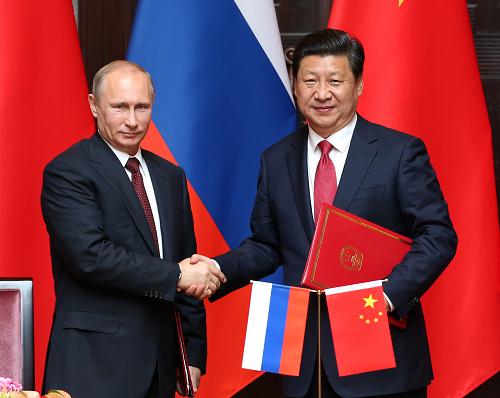The strategic coupling of Sino-Russian relations
- By Cui Heng
 0 Comment(s)
0 Comment(s) Print
Print E-mail China.org.cn, May 25, 2014
E-mail China.org.cn, May 25, 2014
|
Chinese President Xi Jinping (R) and Russian President Vladimir Putin sign a joint statement aimed at expanding cooperation in all fields and coordinating diplomatic efforts to cement the China-Russia all-round strategic partnership of cooperation after their talks in Shanghai, east China, May 20, 2014. [Xinhua] |
China has been attracting a lot of attention recently at the Fourth Summit of the Conference on Interaction and Confidence-Building Measures in Asia (CICA) 2014, which opened in Shanghai on Wednesday, May 20, 2014. The event is the first international summit of such a scale held in China since the country's new leadership took office.
Russian President Vladimir Putin's participation in the summit is also noteworthy, since it is his first appearance at an international event since the Ukrainian crisis, which broke out in February this year. Although visiting China and attending the CICA summit is a routine job for him, the international community still wishes to hear what the Russian top leader has to say regarding Moscow's position on recent updates in Crimea, among other issues.
CICA, an inter-governmental forum for enhancing cooperation and promoting peace, security and stability in Asia, is characteristic of inclusiveness. As a non-Western international mechanism, the CICA consists of member states, featuring almost all political systems. The idea of convening the CICA was first proposed by Kazakhstan President Nursultan Nazarbayev in 1992, in a bid to promote mutual trust and cooperation through dialogue.
The CICA intends to remove the barrier between countries of different ideologies, and countries in different stage of development. Countries with conflicting interests, such as Uzbekistan, Tajikistan and Kyrgyzstan, are willing to carry out dialogue at the CICA; likewise, Pakistan and India would seek common ground in the regional framework.
The Western media, along with the media in some of China's neighboring countries, have noticed that Chinese leaders tend to use the phrase "having Asian countries manage Asian affairs" more frequently. They interpreted it as "China's Monroe Doctrine," because it shows China's urge for a greater role in Asian affairs, much in the same way the Monroe Doctrine provided the legitimacy for the U.S. management of the affairs in the Western Hemisphere. This saying has mirrored China's increasing participation in regional affairs which are directly linked to its own interests.
At the same time, some of China's neighbors have shared the concern that they will be victimized in the contention between China and the United States in seeking regional dominance, in the same way the ongoing Ukrainian crisis worried Ukraine's neighbors.
But after all, the Monroe Doctrine, a term filled with hegemony, cannot truthfully summarize China's activities in its peripheral regions, nor could the reckless remarks of some Chinese officials during the preparation for the CICA.
Beijing has attached great importance to the CICA out of the same consideration as the planning of the New Silk Road, a long term strategy. Maintaining and deepening China's relations with Central Asian countries is the fundamental objective of hosting the CICA.
Kazakhstan is China's important strategic coordinator partners in Central Asia, and a key member of the Shanghai Cooperation Organization. Its geographic location also makes it a key link in the "Silk Road Economic Belt," which is still in the making. Its president, Nazarbayev, who initiated and founded the CICA, enjoys great fame in Central Asian countries.







Go to Forum >>0 Comment(s)